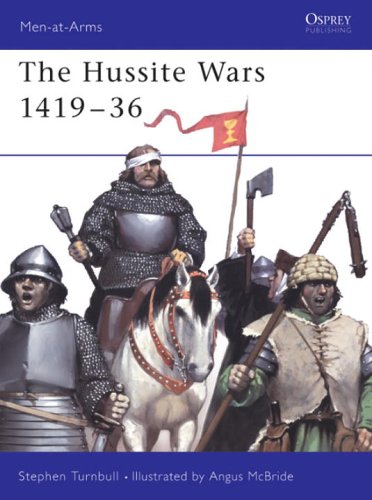I've mentioned before that the art work of Angus McBride has a powerful pull on my imagination. This cover is no exception. In the Warhammer Fantasy Battle Game and the RPG version, clerics of the Empire are mace and hammer wielding fanatics. Seeing the center character here with one eye bandaged and a mace in hand, I was drawn to the book.
And it is another interesting read, well worthy of a look. I had no knowledge, or at least, direction knowledge, of The Hussite Wars before hand, but I am curious to learn more about them now.
One of the things that stands out to me as a reader and a Dungeon Master, is the enormous effect that individuals of character and charisma and skill have had on the world. The Hussite Wars themselves, take their name from Jan Huss. This is something that happens time and time again in the real world history and it's something I often forget about when looking at designing historical battles for any backgrounds I'm working on.
Not all wars can be the War of the Roses with such symbolism crashing through, but named individuals whose actions and fates, can inspire decades of warfare.
In addition to Jan Huss, the man in the centerpiece here, Jan Žižka, is a military genius of his time, revolutionizing the way battles were fought in his home and winning battle after battle despite only having one eye. Even more determination and grit is shown when he losses the other eye years latter and leads his army for another five years. This is something that in a fantasy book, people might laugh at and go, "Yeah right." But here it has apparently happened with no magic involved. Or course history revisionism is another topic...
But another point of interest about Jan Žižka is his death. He doesn't die on the battlefield. Rather, like several great warrior leaders before him, his death doesn't necessarily involve his profession; he dies of the plague in 1424.
The Hussite Wars bring some interesting bits together and showcase historical weight that will continue to roll down in history. When designing your own settings, if things happen at point X, do those actions have further repercussions down the road? Do people look at the leaders of a bygone era and say, "Yes, they were right and we will continue those works."
Lastly, once again, the strength and importance of religion is hammered home. These Hussite Wars are also Crusades with the Hussites being on the receiving end. Mind you they win these battles but the strength of faith is what starts off wars. Thousands of people killed for the methods of worship. This in turn reminds me of the great job Kate Elliot did with her series, Crown of Stars, and how strong the power of belief, without necessarily clerical magic or any magic for that point, can be.
In many fantasy campaigns, these wars of faith can be somewhat difficult. Some settings like the Forgotten Realms and even Greyhawk, are so brimming with deities that the idea of holy war or heresy on a large scale seems completely against the context of those settings. The best one might be able to do with them, is set up rival deities that can have various smaller rivalries and battles.
In these more intimate battles, the actions of single individuals, like the player characters, come more into focus. Do you want to be one man in an army of thousands, or one hero in a handful that knows of the plots of Shar against Sune?
On the other hand, as King of the North proved, althought briefly, the only thing more impressive than a war of faith is a war of gods. One of the fun things about Palladium Books and their Rift setting is that essentially everything is possible. There are gods, there are fake gods, there are ancient elder entities that had the same roles as some of the other gods and all manners of interesting bits and pieces that some how or another make a near whole. But, if you're looking for religious war fare on a grand and cosmic scale, then a war of Pantheons, where entire countries are moved by gods that are real and do take part of the battles, can be the route to go.
Subscribe to:
Post Comments (Atom)





Thanks for bringing this book to my attention. It sounds well worth seeking out and reading.
ReplyDelete